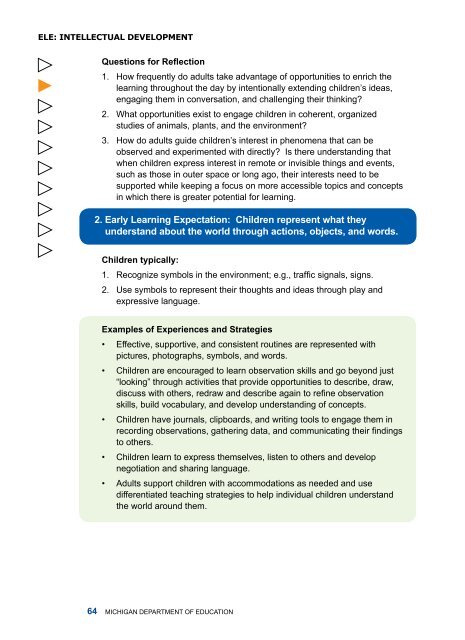Early Childhood Standards of Quality for ... - State of Michigan
Early Childhood Standards of Quality for ... - State of Michigan
Early Childhood Standards of Quality for ... - State of Michigan
Create successful ePaper yourself
Turn your PDF publications into a flip-book with our unique Google optimized e-Paper software.
ELE: Intellectual DevelopmentQuestions <strong>for</strong> Reflection1. How frequently do adults take advantage <strong>of</strong> opportunities to enrich thelearning throughout the day by intentionally extending children’s ideas,engaging them in conversation, and challenging their thinking?2. What opportunities exist to engage children in coherent, organizedstudies <strong>of</strong> animals, plants, and the environment?3. How do adults guide children’s interest in phenomena that can beobserved and experimented with directly? Is there understanding thatwhen children express interest in remote or invisible things and events,such as those in outer space or long ago, their interests need to besupported while keeping a focus on more accessible topics and conceptsin which there is greater potential <strong>for</strong> learning.2. <strong>Early</strong> Learning Expectation: Children represent what theyunderstand about the world through actions, objects, and words.Children typically:1. Recognize symbols in the environment; e.g., traffic signals, signs.2. Use symbols to represent their thoughts and ideas through play andexpressive language.Examples <strong>of</strong> Experiences and Strategies• Effective, supportive, and consistent routines are represented withpictures, photographs, symbols, and words.• Children are encouraged to learn observation skills and go beyond just“looking” through activities that provide opportunities to describe, draw,discuss with others, redraw and describe again to refine observationskills, build vocabulary, and develop understanding <strong>of</strong> concepts.• Children have journals, clipboards, and writing tools to engage them inrecording observations, gathering data, and communicating their findingsto others.• Children learn to express themselves, listen to others and developnegotiation and sharing language.• Adults support children with accommodations as needed and usedifferentiated teaching strategies to help individual children understandthe world around them.64 <strong>Michigan</strong> Department <strong>of</strong> Education


